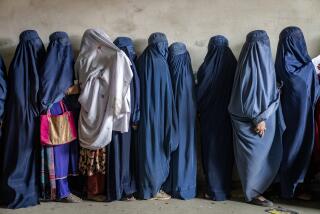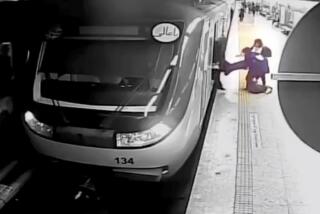In Iran, spring brings out the fashion police
TEHRAN — A springtime morality campaign is sweeping through Iran’s capital.
Police are cracking down on barbers giving Western-style haircuts and shop owners wearing T-shirts with English slogans. They are on the lookout for women wearing head scarves deemed too colorful or small.
Next, authorities plan a filter to block cellphone messages deemed “immoral,” officials announced over the weekend.
Such efforts “to boost ethical security” are announced periodically by the Shiite Muslim regime, and the seasonal indignation usually dissipates within weeks. However, at a time of sharpening internal and external political pressures on the government, some residents fear that the current campaign, which is being more strictly enforced, may last far longer.
Indeed, one female member of parliament, Fatemeh Rahbar, supports the strictures and has called for their institutionalization.
“Enforcing appropriate dress [codes] should be done permanently, not seasonably,” Rahbar said.
Shop owners are concerned that the crackdown will hurt business in shopping malls north of the capital where many young Iranians hang out.
More than 20 upscale fashion boutiques have been closed in recent weeks because their window displays were deemed offensive.
Adding to concerns is that enforcement has been assigned to the Basij, a hard-line government-backed militia.
Authorities have already issued warnings to 1,347 women for being inappropriately dressed. Another 59 deemed provocatively attired were briefly detained.
Last week, an Iranian newspaper reported that security forces had warned 11 European tourists visiting a vegetable market in northern Tehran to observe the Islamic dress code.
Keeping a low profile
Hussein, 23, who sells watches at a Tehran market, said the Basij had been intimidating shoppers. The salesman, who didn’t give his family name for fear of reprisals, wore a blue shirt open at the collar. He said he had been told by a police officer to button up.
At Cafe Godo, Ali and a female companion contemplated fashion over milkshakes.
“These days we are more cautious,” said Ali, who also asked that his full name not be used. The 32-year-old wore his hair tied in a pigtail.
In his shop at the bazaar, his long hair is hidden under a cap. The collar of his shirt shields a silver scorpion pendant when he visits more conservative parts of the city.
Other Iranian fashionistas have refused to back down, and continue to flaunt spiky hair cuts and Hawaiian shirts. Some women also still pay heed to the fashion adage: tight and timeless.
Against ‘moral laxity’
But pressure is mounting.
In a state-sponsored demonstration near Tehran University last week, marchers loudly denounced tight and provocative dress.
A group of radical Shiite militiamen recently issued a declaration condemning “moral laxity and vulgarity promoted in the past years,” an apparent reference to Mohammad Khatami, the reformist predecessor to hard-line President Mahmoud Ahmadinejad.
Although many young Iranians challenge the sartorial restrictions imposed by the country’s Islamic law, Interior Minister Mostafa Pourmohammadi said the government was simply trying to enforce “ethical security” after the demonstrations against attire deemed inappropriate.
Some observers, however, say the crackdown is a ruse to deflect attention from more pressing issues.
Farzane Saeedi, a journalist, said it was not appearances that mattered but what is underneath. “The government wants to overshadow the upcoming petrol price increase and, as a preemptive measure, foil the protests in advance,” she said.
Times staff writer Louise Roug in Abu Dhabi, United Arab Emirates, contributed to this report.
More to Read
Sign up for Essential California
The most important California stories and recommendations in your inbox every morning.
You may occasionally receive promotional content from the Los Angeles Times.










